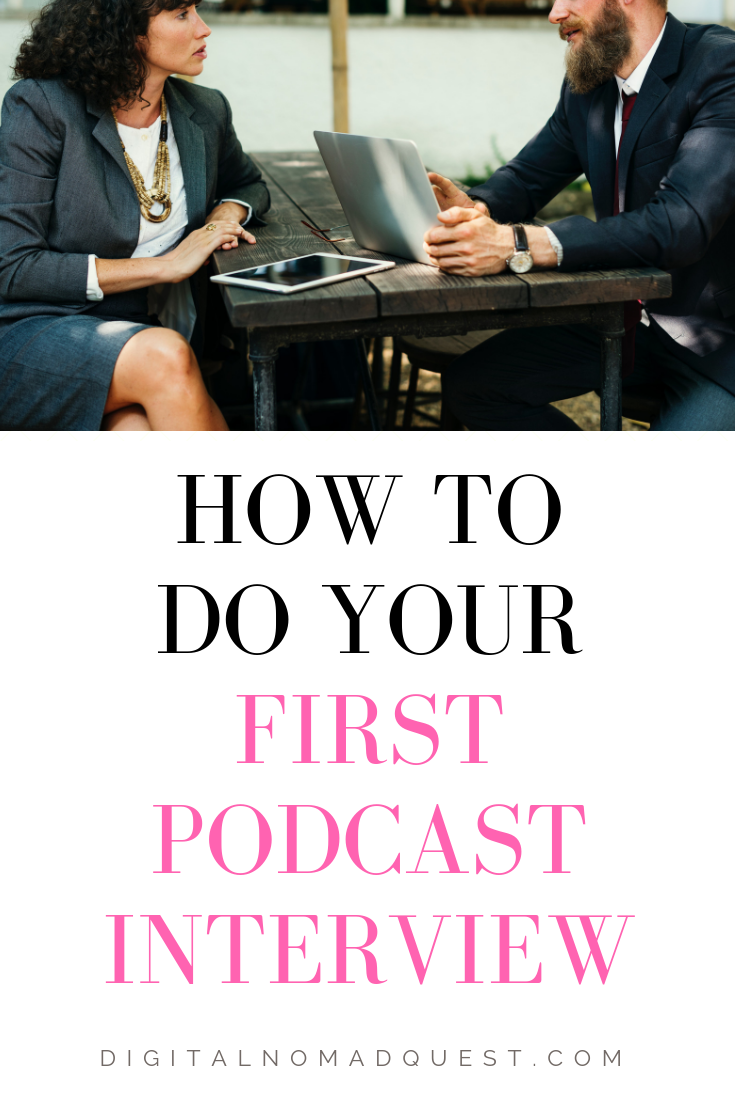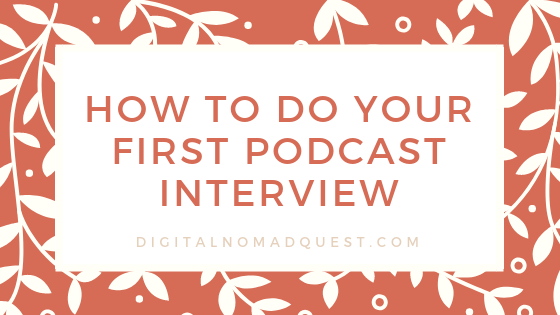Doing your first podcast interview as the interviewee can be daunting, especially if you are shy and awkward like me! For others it might not be a big deal. But in my case, I had been avoiding this challenge for a long time, so obviously mine took more out of me than others.
Since I recently participated in my first podcast interview, I wanted to provide some of my tips and tricks to people who are planning to get interviewed as well. As a disclaimer, I’m still just starting out so I’m a novice in this area but I just wanted to share my experience.
How to Do Your First Podcast Interview (as the Interviewee)
1. Practice
Before the interview, I actually did a few run throughs with my friend to prepare. He would ask questions that he predicted would be asked of me, and that allowed me to practice some of my answers to general digital nomad, travel, and passive income questions. I recommend doing more of these mock interviews over and over again, as well as participate in interviews in the future. The more you challenge yourself, the more you’ll get better and better over practice.
2. Keep track of how many filler words you are using
I ended up using a lot of filler words while I was doing the interview as I mentioned in my previous blog post. Fillers can include words like “so”, “kind of”, “sort of”, “umm”, “things like that”, and “you know”. You get the idea. These words are used when you’re trying to think of what to say and you need something to fill in the gaps of thinking time. It can help to be aware of the filler words you use and avoid if possible.
3. Understand your speaking tendencies and adjust from there
It’s important to understand how you generally talk in interviews and in regular conversational settings. While I was in Taipei, I went to my friend’s radio station and did a quick radio show interview. I ended up getting shy and not saying much, so after the episode he made fun of me and we laughed. With that in mind, I realized I needed to talk more and dive into topics if I can. Therefore I made it a point to answer questions extremely thoroughly as well as provide my input even when I wasn’t being asked a question. So I tried my best to talk more than I regularly would. In the future, hopefully I’ll be able to keep conversations flowing without needing this pressure or goal to get it right. If you’re the type (like me) who doesn’t talk much, make it a note to talk a bit more in interviews (as long as you’re on topic). And if you’re the type who talks way too much, take note of that and make sure you are conscious of how the conversation is going on both sides. Make sure you’re not blabbing on and on!
4. Ask the interviewer if they are able to provide some questions that they plan to ask you
On my first podcast interview, I e-mailed J and Gwen asking if there were some questions or ideas on what topics they would ask me. But since Fire Drill Podcast has tons of people on the show, they don’t necessarily have time to make show outlines and questions before the interview. In the end, they were able to give me some general topics that they would ask me including passive income, digital nomading, and traveling. It is worth it to ask your interviewer ahead of time if you could receive a general outline or ideas on questions for your upcoming interview. That way you can best prepare yourself for what’s to come.
5. Prepare the right equipment and settings
You’re going to want to use a decent microphone on these interviews. I used a basic condenser microphone (the MXLV63M) hooked to an Alesis IO2 audio interface. But for those just starting out, I would actually recommend this microphone: Audio-Technica ATR2100-USB Cardioid Dynamic USB/XLR Microphone just cause Pat Flynn recommended it as a good starter microphone for podcasting (you can refer to the notes I took on his seminar here). It is easier to use a USB microphone cause once you plug it in it should work (versus using an audio interface and condenser microphone).
The interview I did was through Skype, but I was having some technical difficulties setting up. On Skype you’re going to want to change your audio settings to the microphone you want to record with. Also make sure you’re connected to the right Wi-Fi setting. We were having issues where the recording was going in and out, and we were going to reschedule because it seemed my internet connection wasn’t good enough. After ending the call I realized I was connected to Xfinity Wi-Fi rather than my home Wi-Fi. I called them back letting them know that we didn’t need to reschedule and we could just do this interview right away. I should have been more prepared as this ended up wasting some time.
In short, prepare the right microphone, adjust your settings on Skype, and make sure you’re using the right Wi-Fi connection.
Conclusion
Ultimately, getting better at interviews and public speaking will just come with practice. Rather than avoid something seemingly scary, challenge yourself to do the things that make you fearful. Cause that’s how you start working towards breaking down that fear.



Comments 3
Good Article.
Whenever i need to learn about podcast i only came on your website because i know you provide so much value
Cheers,
Vishal
Author
Thank you!
As a fellow Podcaster this is great and simple instruction for hosts! Love it.